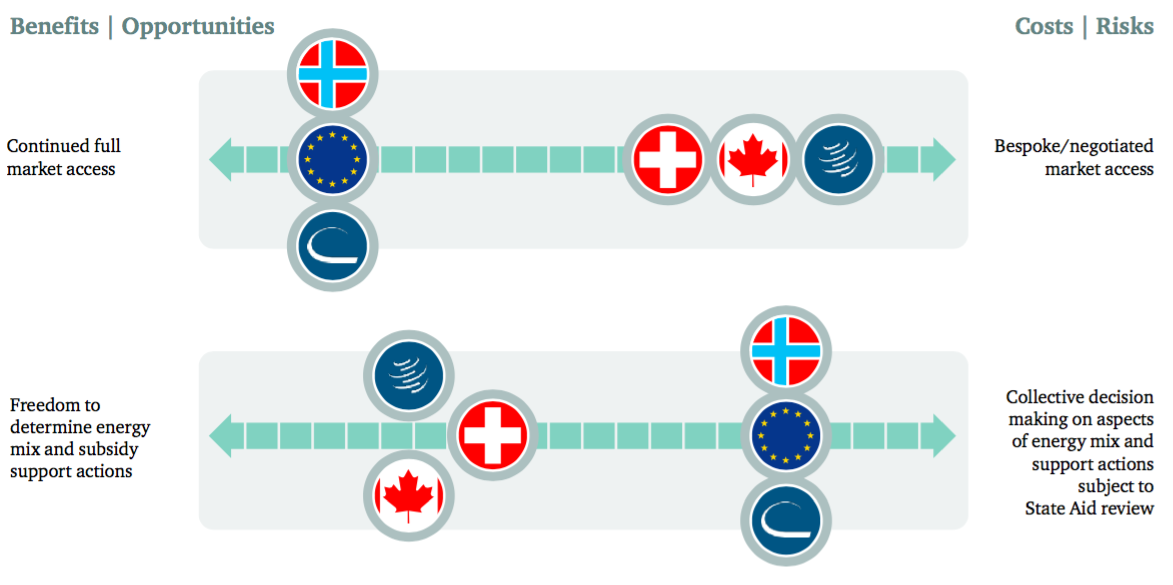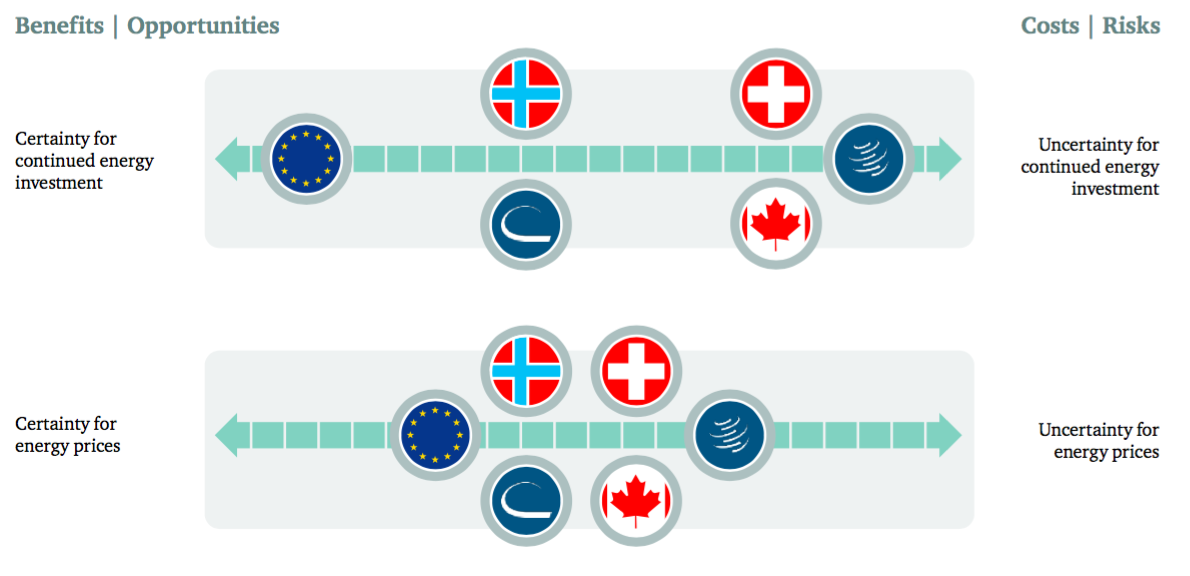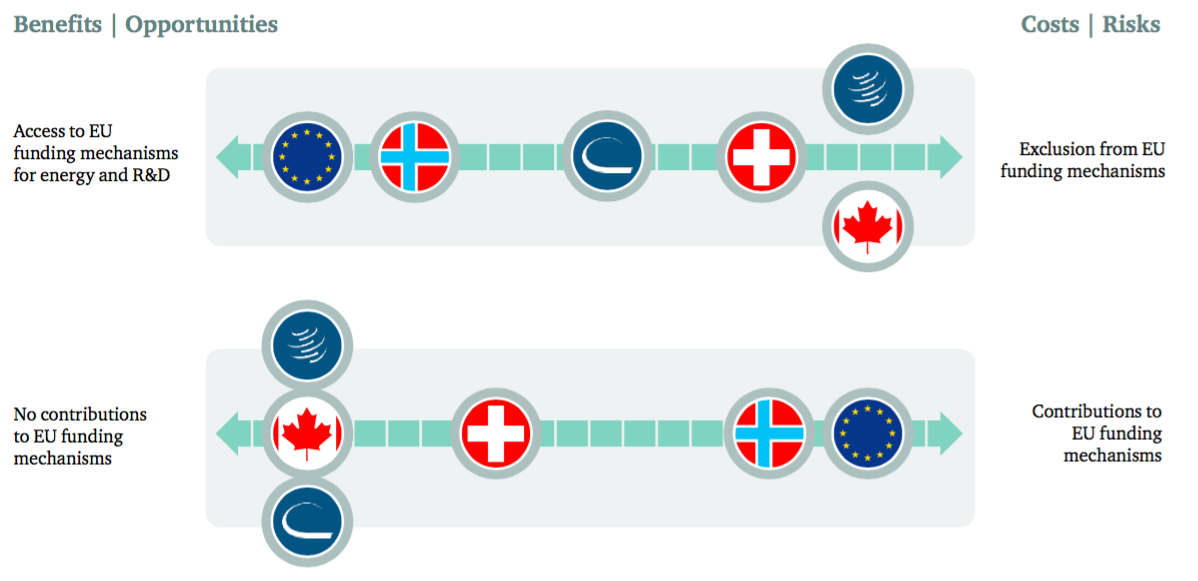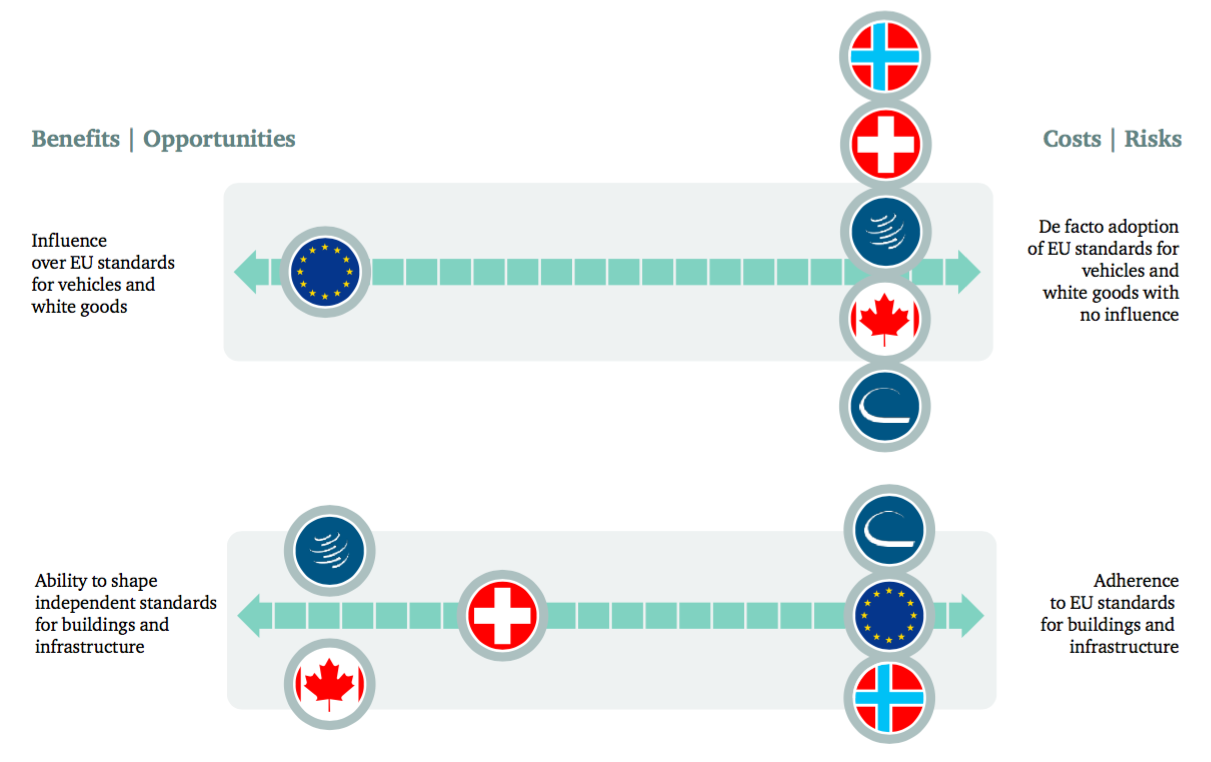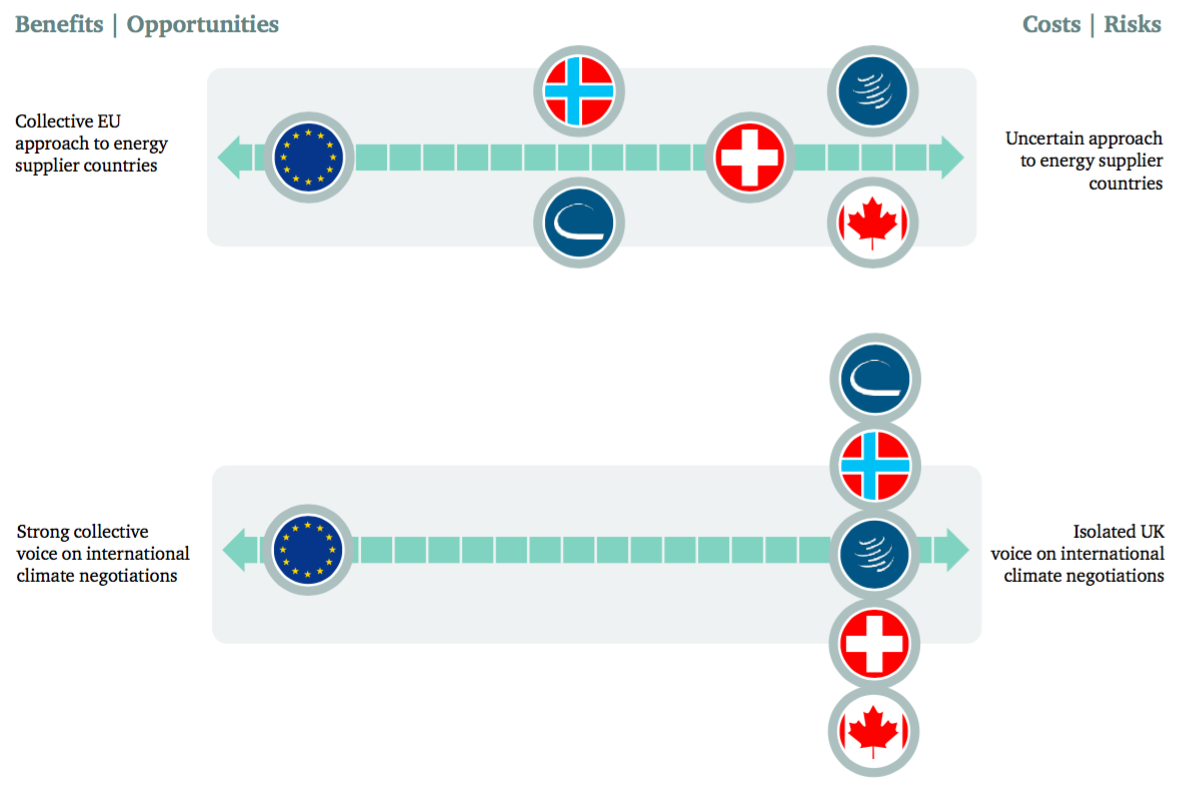Chatham House: Brexit could harm UK climate and energy policy
Sophie Yeo
05.26.16Sophie Yeo
26.05.2016 | 12:01amThe UK is better staying in the EU from the perspective of energy and climate change, according to a new paper by international affairs thinktank, Chatham House.
The question of whether the UK votes to leave or remain in the EU will be decided by a referendum, which is scheduled to take place on 23 June.
There has been no shortage of opinions on the issue, which many view as a defining moment regarding Britain’s place in the world — Carbon Brief has been tracking those relating to climate and energy.
The latest offering from Chatham House is particularly thorough, as it spells out what the impacts for the UK’s energy system and climate goals might be under the various scenarios that could be adopted, should the UK vote to leave.
Chatham House, which conducts research on subjects including climate, economics, law and security, receives funding from more than 500 donors, including the European Commission, Shell, Rockefeller Foundation and a range of national governments. It says: “This diversity of global support is critical to the independence of the institute.”
Scenarios
No member state has left the EU before, which means there is no precedent for how exactly the UK might extricate itself from its relationship with the EU, and what kind of arrangement it might establish in its place.
Several countries outside the EU have a formal relationship with the bloc, to which the UK could subscribe. It is also possible that the UK could negotiate its own unique relationship with the EU.
Each option presents various choices and trade-offs that could impact climate change and energy policy, says the report. These include the degree of access that the UK has to Europe’s gas and electricity markets; the extent to which the UK would be able to influence EU decision-making on energy policies; and the ease with which a deal could be negotiated with other EU states and institutions.
The following table, taken from the report, summarises the various options that could be available to the UK in the case of a “Brexit”, and also what a remain vote would mean.
In this table, EFTA stands for European Free Trade Association, an organisation that extends free trade to four non-EU states: Iceland, Liechtenstein, Norway and Switzerland. EEA stands for European Economic Area, which provides for the freedom of people, goods, services and capital between the 28 EU member states and Iceland, Liechtenstein and Norway. Acquis communautaire means the EU’s body of laws and rules.
Impact for climate and energy policy
The report looks at six areas of energy and climate change policy in the UK that could be affected by a vote to leave.
These areas are: market access; investment; funding; standards for goods and services; climate change and pollution targets; and diplomatic engagement.
For each of these six areas, the Chatham House report spells out the implications and presents a graphic illustrating the benefits and opportunities compared to the costs and risks for each Brexit scenario.
Market access
The UK is strongly integrated with other EU states when it comes to energy, and greater use of renewables is increasing the need for interconnectors, says the report.
The EU has progressively liberalised energy markets over the past two decades, moving regulatory control away from governments and towards independent national and EU bodies, its says. Further market liberalisation measures are due to be introduced at EU level during 2016.
The report says that the UK’s current government is unlikely to want, or be able to, reverse the trend of domestic energy market liberalisation in the event of a Brexit. While some models would provide long-term continuity to accessing the market, the report points out that a successful agreement is not guaranteed and could take years.
Energy investment and price security
The energy sector is in need of significant investment in order to replace ageing infrastructure and enable decarbonisation. The UK government estimates that total energy infrastructure investment requirements between 2014/15 and 2020/21 will be £274.9bn.
The UK is currently a major recipient of foreign direct investment (FDI), with EU countries accounting for over half this flow. A report for the UK parliament concluded that it was not possible to calculate the impact of EU withdrawal on the flow of FDI, but a survey by Ernst & Young on company confidence for power and utilities indicated a concern that a vote to leave the EU could make capital more difficult to access.
The decision could also affect the price of electricity, the report says. Additional interconnectors to the continent and Ireland by the end of 2021 could provide more than 10 gigawatts of power capacity and lower the wholesale market price for baseload electricity by 7%, HSBC has predicted. The report doesn’t expand upon whether these would go ahead in the case of a vote to leave.
On the other hand, most of the social and environmental costs seen in customer bills are the result of domestic rather than EU legislation, including the Climate Change Act and Fuel Poverty Regulations, which are unlikely to change.
Funding mechanisms
The UK is currently a net contributor to the EU budget, meaning that it gives more in direct contributions than it receives in EU expenditure.
However, it has received significant funding from the EU for energy- and climate-related projects. Under the EU’s current seven-year budget (2014-20), the UK is set to receive €1.9bn for climate change adaptation and risk prevention, and €1.6bn to support the transition to a low carbon economy. It has also received significant loans from the European Investment Bank.
The UK would give up access to most of these funds under most exit models, says the report. Meanwhile, countries such as Norway and Switzerland still make a sizeable contribution to the EU budget.
If the UK adopts a model which allows it to retain its EU budget contribution and, therefore, spend it on domestic projects, it would be up to the UK government to decide how much it allocated to energy- and climate-related projects, in the face of various competing priorities.
Standards for goods and services
The EU sets standards for vehicles, goods and buildings that have established a baseline for energy efficiency across Europe.
The report points out that the UK would be unlikely to abandon these standards in the case of a Brexit, as it would still have to meet all future minimum standards to continue to trade with EU countries. The UK is also likely to continue with energy efficiency programmes to meet its domestic climate change commitments and lift 2.34 million people out of fuel poverty.
While it is likely to continue to abide by EU regulations, all options for leaving the EU would lead to the UK having no say in setting them in the future.
Climate change and pollution targets
The UK is bound by the EU’s climate change legislation, but its own domestic legislation goes beyond the European targets. Therefore, withdrawing from the EU is unlikely to immediately impact the UK’s ambition when it comes to climate change, says the report — although it would make it easier for the UK government to change course in the future, as only a change in domestic legislation would be required.
Withdrawing from the EU would also require the UK to draw up its own contribution to the UN climate deal, as Norway and Switzerland have done. It is less clear how EU withdrawal would affect UK renewable targets, the report says.
Leaving the EU could also release the UK from the Industrial Emissions Directive, which will, in particular, drive down coal use. However, the UK has already achieved cross-party support for phasing out unabated coal power, and tackling air pollution is likely to remain a priority.
Diplomatic engagement on energy and climate security
The UK is better off negotiating within the EU than as a lone voice when it comes to both energy security and climate change, argues the Chatham House report.
Concerning energy security, the UK would no longer be party to EU negotiations with Russia, from which the UK gets 16% of its energy imports. While it could continue to operate on a bilateral basis with other energy producers and importers, the country would carry less diplomatic weight when operating alone, says the report.
The situation is similar within the UN climate change negotiations. Negotiating with the EU allows the UK to operate on a par with emitters such as the US and China. But without the backing of the EU, it would be relegated to the second tier of global powers, alongside Australia, Canada and South Korea, says the report.
Meanwhile, the EU may swerve towards the positions of member states arguing for less stringent ambition on climate change, without the UK’s support for strong international climate leadership.
Conclusion
The exact model that the UK adopts should it choose to leave the EU will determine the extent of the impact on climate change and energy policies. However, all will generate significant uncertainty, says the report. It summarises the overall risks and opportunities with this final graphic:
The implications for climate and energy may not have made front page news in the reams of Brexit coverage to date, but it could end up being a defining issue in years to come if the UK decides to leave the EU, it concludes:




